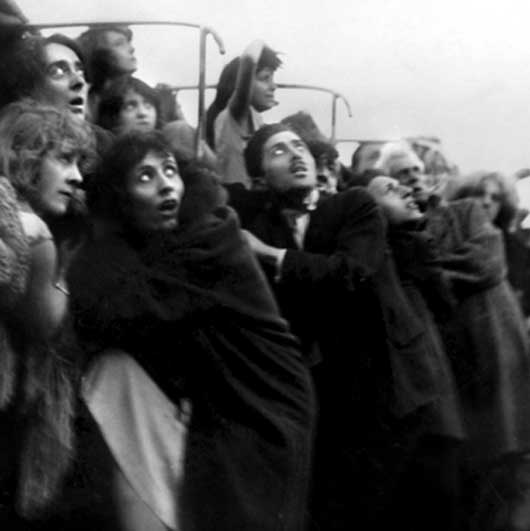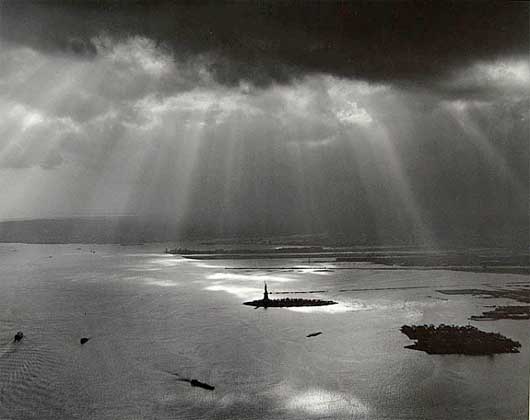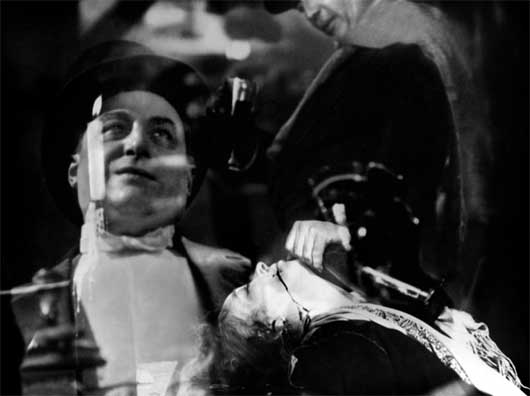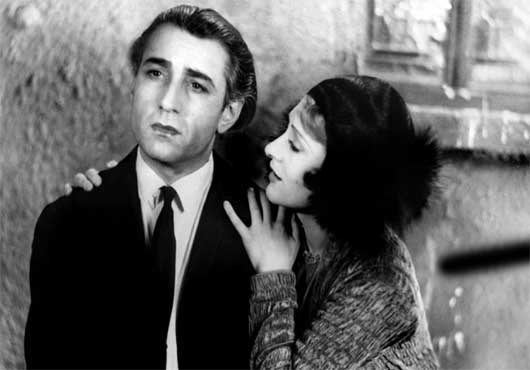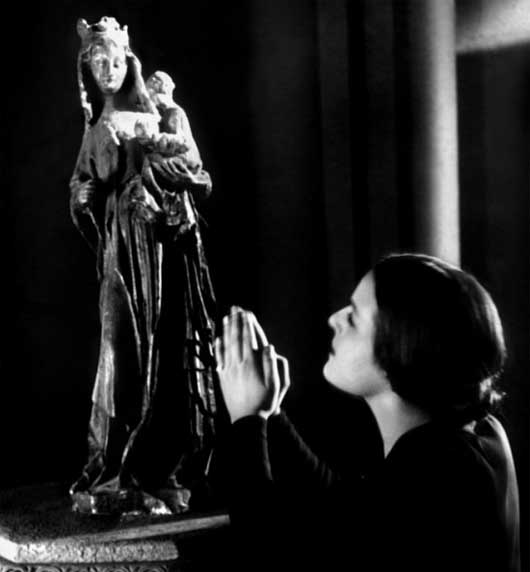
A Conversation With Kenneth Koch
Kenneth Koch met John Ashbery at Harvard, where the two became fast friends. Before his death in 2002, Koch became known for the quality of his teaching and his prolific career as both a poet and a playwright. The rare heterosexual member of the New York School, Koch's 1965 conversation with his friend takes on the staginess of drama while revealing much about how the two viewed each other's artistic work and private life.
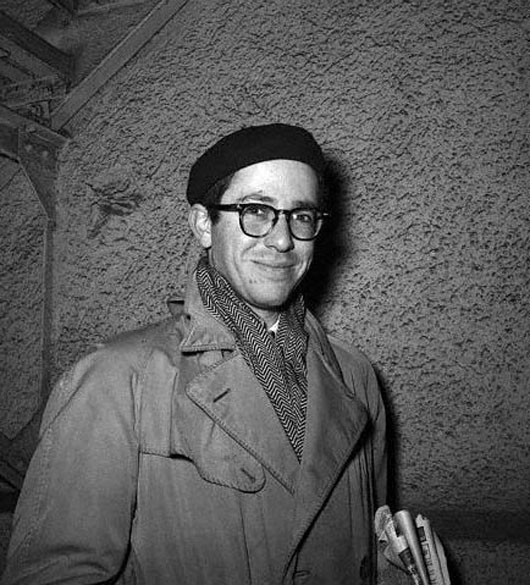 koch
koch
KENNETH KOCH: John, do you think we both might be too much concerned with matters of taste? Or don't you think it's possible to be too much concerned with it?
JOHN ASHBERY: What else is there besides matters of taste?
KK: How would you change that statement if you wanted to put it in a poem? I think that statement would seem too pompous to you to put into a poem. Or too obvious.
JA: I would not put a statement in a poem. I feel that poetry must reflect on already existing statements.
KK: Why?
JA: Poetry does not have subject matter, because it is the subject. We are the subject matter of poetry, not vice versa.
KK: Could you distinguish your statement from the ordinary idea, which it resembles in every particular, that poems are about people?
JA: Yes. Poems are about people and things.
KK: Then when you said "we" you were including the other objects in this room.
JA: Of course.
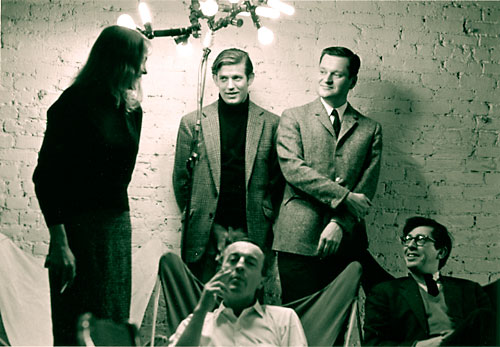 ashbery standing, koch sitting next to o'hara
ashbery standing, koch sitting next to o'hara
KK: What has this to do with putting a statement in a poem?
JA: When statements occur in poetry they are merely a part of the combined refractions of everything else.
KK: What I mean is, how is the fact that poetry is about us connected to the use of statements in poetry?
JA: It isn't.
KK: But you said before -
JA: I said nothing of the kind. Now stop asking me all these questions.
KK: I'm sorry.
JA: Now I'll ask you a few questions. Why are you always putting things in Paris in all of your poems? I live there but it seems to me I've never written anything about it.
KK: Isn't "Europe" mainly set there?
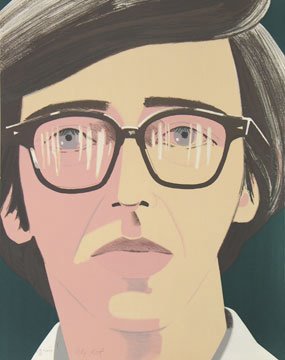 JA: No. Reread that poem. It all takes place in England.
JA: No. Reread that poem. It all takes place in England.
KK: What about the gray city and the snow valentines and so on - even though the main part of the narrative obviously takes place on the flying fields of England, the real psychological locale of the poem always seemed to me to be in Paris. No? Where were you when you wrote it?
JA: In Paris. But there is only one reference to Paris in the entire poem.
KK: Well, I wrote Ko in Florence.
JA: I wish you would answer my question and also explain -
KK: And there is only one reference to Florence in it, but the way things come together and take place always seemed to me to be very dependent on the fact that it was written in Florence. What did you want me to answer?
JA: Let's ignore for the moment at least your enigmatic statement that the way things come together reminds you of Florence –
KK: I did not say that.
JA: Anyway I wish you would explain for me and our readers –
KK: Listeners.
JA: – why we seem to omit references to the cities in which we are living, in our work. This is not true of most American poetry. Shudder.
KK: Hmm. I guess we do. I did write one poem about New York while I was in New York, but the rest of the poems about America I wrote in Europe.
JA: I repeat, why we seem to omit ALMOST all references – ?
KK: I find it gets to be too difficult to get through my everyday associations with things familiar to me for me to be able to use them effectively in poetry.
JA: Snore.
KK: I myself am bored by my attempts to make abstract statements and wish I could do it as facilely as you do. I'm going to cut out my previous statement. What made you snore?
JA: Well, if you're cutting out your statement, then my snore naturally goes with it, I suppose.
KK: Maybe I won't cut it out. Or I might just keep the snore.
JA: It sounded too much like the way all artists talk when asked to explain their art.
KK: Yes, I agree. I dislike my statement. Why do you suppose are so bothered by such things?
JA: It's rather hard to be a good artist and also be able to explain intelligently what your art is about. In fact, the worse your art is the easier it is to talk about it. At least, I'd like to think so.
KK: Could you give an example of a very bad artist who explains his work very well?
JA: (Silence)
KK: I guess you don't want to mention any names. Why don't you want to mention any names, by the way? Especially since I once heard you say that names are more expressive words than any others.
JA: Some people might get offended. I don't see the point of that.
KK: Do you mean you're afraid?
JA: No. Just bored in advance by the idea of having to defend myself.
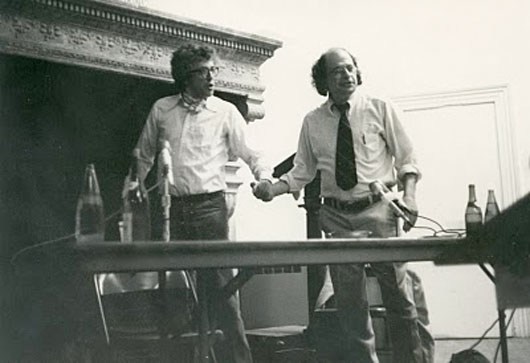 koch and allen ginsberg at st. marks poetry project 1977
koch and allen ginsberg at st. marks poetry project 1977
KK: Have you ever been physically attacked because of your art criticism?
JA: No, because I always say I like everything.
KK: Would you say that is the main function of criticism?
JA: If it isn't it should be.
KK: How can one talk about what should be the function of something?
JA: Our problem seems to be to avoid it.
KK: To avoid what?
JA: Talking about what you said.
KK: Let me go back a little.
JA: That's always a mistake.
KK: All right, I'll take you at your word. But we were getting on to something interesting – but it went by so quickly.
JA: This is true of much great poetry.
KK: And even truer of the rest of it. I was thinking today as I drove over here what my poetry could possibly do for me or for anyone who reads it. I thought it might make people happy temporarily.
JA: That's a pretty tall order.
KK: I know. I was just going to change the word from happy to something else.
JA: I'd be interested to know what you were going to change it to.
KK: Maybe to pleasantly surprised.
JA: Now you're talking!
KK: I was thinking about that and about what seemed the uselessness of it all. In fact I think about that a lot.
JA: Is Joseph Dah your ideal?
KK: In what phase? As an action poet or as a regular poet, which he becomes after the death of Andrews?
JA: As an action poet.
KK: I was thinking about that in the car today, though I didn't think about Joseph Dah. I was wondering if there was some way to make one's actions as varied and interesting as poetry; I didn't think about whether it was really possible to retain some degree of strength and youth in one's poetry even though one's body were getting weak and old. Then I wondered if there were any point in doing this. I thought that if I was wondering if there was any point in remaining young and strong and in being great and happy then I must be bothered or depressed about something else, since in what I have usually considered my normal states I am very interested in these things. Thinking thus, I drew into the Hazans' driveway and we began this interview.
JA: Do you have any idea about how you could make your actions more varied than they are?
KK: Absolutely none.
JA: Your witness, Mr. Defense Attorney.
KK: You're a wit and I see that you are obviously going to win this interview.
JA: I don't like to think that I might have wit. It's the one chink in my non-existent armor.
KK: Your last remark would indicate you don't have to worry too much about it.
JA: I'll pass over your use of the subjunctive and return to the "problem." What is the nature of our poetry? I mean, first, is it poetry? And second, does it have a nature?
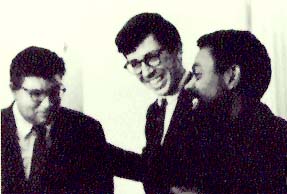 morton feldman, koch, leroi jones
morton feldman, koch, leroi jones
KK: A third question might be whether your poetry or mine are sufficiently similar to be discussable as "our poetry." Let's just say that they are; otherwise we'd have to make too many distinctions as we went along.
JA: Can you think of an example of poetry?
KK: Yes. Though it depends on what you mean by the word. There is, after all, a certain well-deserved opprobrium attached to it.
JA: Mmmm. But just what is this opprobrium and who deserved it? I was reading recently in a book by Jean Paulhan that ever since the nineteenth century poets have been contemptuous of poetry and novelists of novels. In fact somebody - I believe it was Sainte-Beuve - once criticized somebody else – Balzac, I think – by saying, "Ça tombe dans le roman"; and Victor Hugo prided himself on not being "just a poet." On the other hand, you hear a lot of painters these days say that the only thing that interests them is painting. Since I brought up the subject of painters, I would like to mention that the spaces between things seem to be getting bigger and more important.
KK: Do you mean in painting or in life?
JA: We'll work this out later. Meanwhile, I once read that as music becomes less primitive and more advanced the intervals between the notes get bigger. Compare the "Volga Boatmen" with the Love-Death from Tristan and Isolde. A lot of our good painters seem to rub out most of the picture these days. It gets harder to make the connections between things. Now I'd like to quote a line of your poetry in order to prove this. (Long silence.)
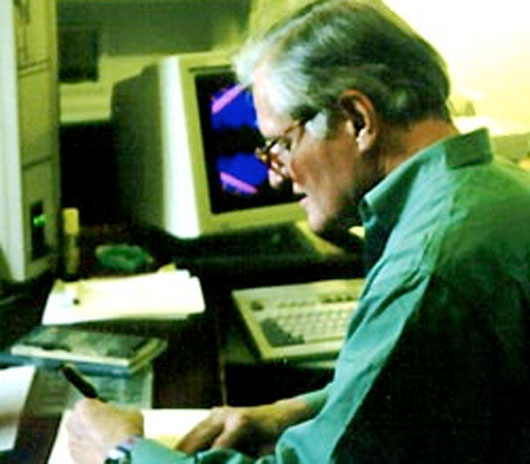
KK: Why don't we use some of your lines instead?
JA: Okay. Toss me my book.
KK: Do you mean you couldn't find any examples in my poetry?
JA: Mmmm. You cut out all of your incomprehensible poems.
KK: No, I didn't. What about "January 19th"?
JA: "Lorna Doone fizzled the dazzling icicle pencil by sheer blue shirts."
KK: What are the spaces in it?
JA: The words that would explain the relationships between these various things.
KK: You mean that would explain how one could fizzle a pencil by shirts?
JA: That's right.
KK: Could you please give me an example from your own poetry, to make it clearer?
JA: I think it's already clear enough but I will if you insist.
KK: It is quite brilliant.
JA: Nonsense. "Night hunger / of berry...stick." This isn't such a good example as a matter of fact.
KK: Why?
JA: What with the prevailing climate in poetry, these lines seem perfectly crystalline to me and should to any reader with a normal I.Q.
KK: When you say "crystalline," do you mean that the lines mean only one definite thing?
JA: Well, not more than about four at the most.
KK: It does seem obvious. A man is hungry for berries at night and goes out to get them with a stick. Or else he goes out to get them and he is touched on the face by a stick (part of a branch). Or the berry itself is hungry at night and looks to the stick for refreshment, which it does not get from it. Or the berry is so hungry at night that it dies, its whole branch dies and later becomes a stick. Or a man is hungry for berries at night, goes out to get one and it sticks to him. Or the berry gets so hungry at night that in its hunger it attaches itself to something else and gets stuck to it. These seem to me just a very few of the meanings related to all the possible meanings as our galaxy is to the sum total of all galaxies.
JA: Since none of these meaning is very interesting, what the poet's poet in making it so ambiguous, assuming that this itself was not the point? I mean making it ambiguous so as to conceal the apparent lack of interest in the various ideas expressed.
KK: Well, if you are following the poem and if you come to the place where you don't know if you're a man or a berry and you keep going along anyway, then you're having a mystical experience. Lines like these enable the reader to escape from his ordinary consciousness of himself. Aside from which, it's very enjoyable to feel like a berry or a stick or a person you know nothing about.
JA: I don't know as I'd care to feel like a berry, let alone a stick, and I too often feel like a person I know nothing about.
KK: What's his name?
JA: If I knew his name I'd know something about him.
KK: Go on with what you were saying about your line. What's your answer to the question?
JA: No, I was just wondering if ambiguity is really what everybody is after, but if it is the case, why?
KK: People seem to be after it in different ways. Actually one tries to avoid the Cleanth Brooks kind, no? It seems an essential part of true ambiguity that it not seem ambiguous in any obvious way. Do you agree?
JA: I don't know. I'm wondering why all these people want that ambiguity so much.
KK: Have your speculations about ambiguity produced any results as yet?
JA: Only this: that ambiguity seems to the same thing as happiness - or pleasant surprise, as you put it. (I am assuming that from the moment that life cannot be one continual orgasm, real happiness is impossible and pleasant surprise is promoted to the front rank of the emotions.) Everybody wants the biggest possible assortment of all available things. Happy endings are nice and tragedy is good for the soul, etc, etc.
KK: You speak after my own heart but you speak more as an aesthetician than as a man. Perhaps there is really no distinction between the two, but some pleasures do free one from desiring others.
JA: Name one.
KK: The pleasure of relief from pain frees one temporarily from the desire to suffer.
JA: So the desire to suffer is a pleasure?
KK: No desire is a pleasure. But suffering is accounted a pleasure by many. Let me put it another way. Relief from pain frees one momentarily from the desire to take great risks involving pain but which might lead to some small pleasure.
JA: I think that ambiguity includes all these things.
KK: An obviously evasive answer, but I'm afraid we're off the subject anyway. A better example is that if one is passionately in love one does not desire a lot of other people. In fact love sometimes makes people indifferent to pain and even death. I know this is true both from books and from experience.
JA: I won't embarrass you by calling attention to the obvious flaws in your argument. Getting back to my favorite theme, the idea of relief from the pain has something to do with ambiguity. Ambiguity supposes an eventual resolution of itself, whereas certitude implies further ambiguity. I guess that's why so much "depressing" modern art makes me feel so cheerful.
KK: Could you go back now and explain what you felt when you wrote those lines about the berry?
JA: Afraid not. I had even forgotten the lines, let alone having written them. And this has some bearing on our topic of discussion.
KK: Many poets don't ever forget what they've written. I can see our forgetting our lines either as good or as bad. Do you forget any place in which you've lived or anything you've liked very much? I mean within the last five years.
JA: I don't quite see what the point of that is. I mean writing a line of poetry isn't the same as living someplace.
KK: I was just thinking of how your forgetfulness might be criticized – that is, from the point of view that what you write doesn't mean enough to you for you to remember it. I don't agree with this criticism at all. I just thought my remark might stir you into explaining why you don't necessarily remember your poems.
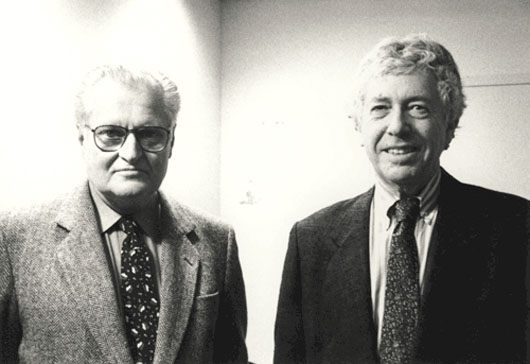 ashbery and koch in later yearsJA: If you don't agree with this criticism, then perhaps you'd be kind enough to explain why, since I fear it's a very telling one.
ashbery and koch in later yearsJA: If you don't agree with this criticism, then perhaps you'd be kind enough to explain why, since I fear it's a very telling one.
KK: I don't believe that you do. If you did you'd memorize your poems.
JA: It seems to me that forgetting plays a bigger role in our poems than either of us is willing to own up to. Not only do we forget the place where we live, as I pointed out earlier –
KK: You did not say that. You said we didn't write about the place in which we live.
JA: Well, we might just as well have forgotten it, for all the difference it makes. Also what about sex, which seems to make no appearance in either of our works - that I can think of at the moment.
KK: Do you mean the details of sexual intercourse? Practically every poem either of us has written seems to me to be about love in some form or another.
JA: Well, so what happened to those details?
KK: I hope they are still there.
JA: Look again.
KK: Yes, I've just gotten word that they are still there. On the other hand, there are a number of things that would not be out there at all if we didn't write about them.
JA: Does this mean that you think these things are important?
KK: What things?
JA: What it is that's there.
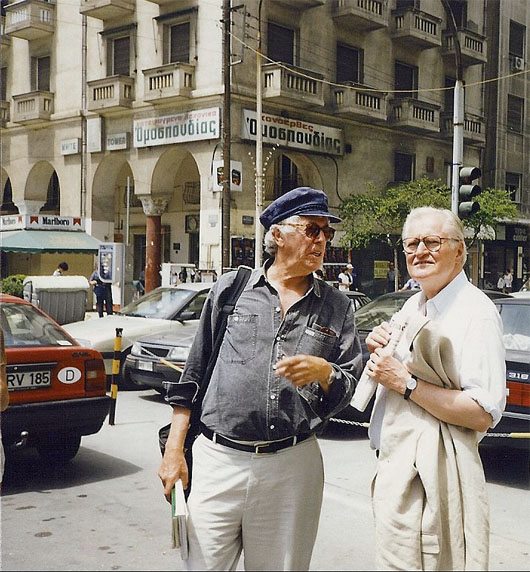 in thessaloniki
in thessaloniki
KK: Do you mean the things we write about or the details of physical love?
JA: The things that wouldn't be there unless we wrote about them, blockhead.
KK: It is you who are the blockhead for not making your questions clearer.
JA: Maybe this has some bearing on the topic of our discussion.
KK: In what way?
JA: I can't remember what it was that we were talking about.
KK: You seemed to be talking about ambiguity; and then you seemed to think that being a blockhead had something to do with it.
JA: I think we should clear up the question as to whether the ambiguity in our work is the result of modern life's having made us so ashamed of our experiences that we cannot write about them in any other way, or whether we feel that if we turn quickly around we'll discover something that wouldn't have happened otherwise.
KK: The first possibility you mention I don't understand – how can "modern life" make us ashamed? – but the second is very appealing. I don't feel, by the way, that what I am after in my work is ambiguity.
JA: What do you feel that you are after?
KK: Guess.
JA: I give up.
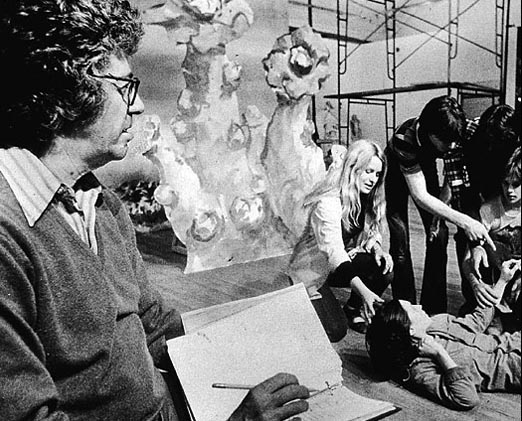 at a rehearsal for his play, 1977
at a rehearsal for his play, 1977
KK: Do you mean to say that you have been reading my poems all these years thinking ah there he's succeeded in getting that ambiguity he's after, and oh there he hasn't? I mean you don't really think that a main aim in my poetry is to be ambiguous, do you?
JA: Well, it would help if you would consent to give a straight answer to my last question.
KK: I think the difficulty of my doing so has considerable bearing on the topic under discussion.
JA: Since you refuse to reply unambiguously, I must conclude that ambiguity is the central thing in our work.
KK: I have always liked your poetry, but your command of logic leaves me speechless with admiration.
JA: Perhaps this has some bearing on the topic of our discussion.
KK: I don't see how.
JA: I assume you were being ironic when you said my command of logic left you speechless with admiration. Therefore poetry is not logical or is not necessarily so.
KK: What you say is very unclear, but I suppose you mean that since I find one of your remarks illogical and since I like your poems, that therefore I must like poems which are illogical. But I don't find your poems either logical or illogical. If you want this interview to have the logic of a poem and not ordinary logic we will have to start over again.
JA: If you don't find them logical or illogical, then what do you find them?
KK: Your question doesn't make any sense.
JA: Neither does your poetry.
KK: Do you think there's only one way of making sense? (We seem to be trying to trap each other into making pompous statements.)
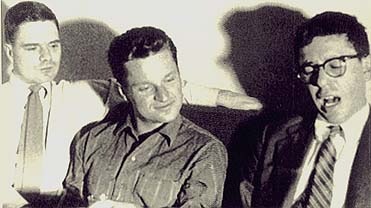 schuyler, ashbery, kochJA: Yes, we seem to be determined both to discuss poetry and not to discuss anything at all. This is probably what we do in our poetry. I only wish I knew why we feel it to be necessary.
schuyler, ashbery, kochJA: Yes, we seem to be determined both to discuss poetry and not to discuss anything at all. This is probably what we do in our poetry. I only wish I knew why we feel it to be necessary.
KK: I should think that if we really wanted to know why we felt it to be necessary that we could probably find out. I don't think we really care.
JA: You're right.
KK: Perhaps there's an element in our poetry of not wanting to be too definite, not wanting to name things too clearly, in order that nobody else can possess any one of them independently of the whole poem. But the statement I have just made, although it seemed rational to me when I made it, now seems to me to make no sense.
JA: Does this ever happen to you when you write poetry?
KK: Constantly. It's very exciting when it does; if one writes fast enough when this is happening one can catch the movement of the mind, which is I think something I care about very much, more than ambiguity for example. Of course it's true that the mind perceives everything ambiguously. I think we may be close now to an answer to our problem.
JA: Why does catching the movement of the mind seem important to you?
KK: I knew you'd pick up on that bit of critical gibberish. But I rather think you know what I mean and that you are stalling for time.
JA: Whenever I read a sentence, including a line of my own poetry, I am beset by the idea that it could have been written any other way. When you are conscious of this while writing, it can often be very exciting. I respond to works of art which express this idea, such as the music of Busoni, the main element of whose style is that it didn’t necessarily have to sound this way.
KK: Do you think the kind of art that you and I like and create might be called "evasive"? Do you think we like the feeling of ambiguity and multiple possibilities partly or wholly because we don't want to be pinned down to anything we've done or are about to do?
JA: Possibly. But I think that if we like things that are evasive it's because there's no point in pursuing something that is standing still. Anything that is standing still might as well be dead.
KK: What about overtaking something that's moving clearly in one direction or meeting something head on? I mean, why this passion for two things at once? Obviously it corresponds to reality. One sleeps and is in bed at the same time. But why is this so important to us and other artists?
JA: I don't understand what you mean about sleeping and being bed at the same time.
KK: Oh. That was just an example of how simultaneous actions or states in reality correspond to those in art. I mean, all aesthetic attitudes or ideas correspond to the real state of things. We could just as easily be so warmly interested in the concreteness of everything, or in its human or divine qualities, as we are in its ambiguity and multiplicity.
JA: But all these things you mention do constitute multiplicity. It seems necessary to illustrate this fact by examples.
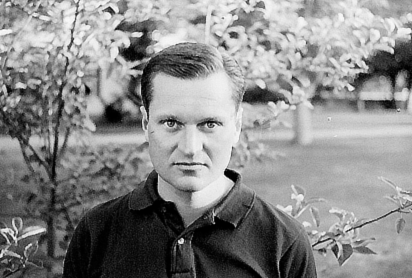
KK: Would you say that's why you write poetry?
JA: Yes.
KK: For whom do you do this illustration?
JA: For the average reader.
KK: Do you expect to help him in this way?
JA: No, I expect him to help me.
KK: How?
JA: By drawing attention to the fallacies in my approach.
KK: Has any average reader ever done this for you?
JA: No, but I'm still hoping that he will. That's what keeps me going.
KK: You would say that you write then chiefly in the hope of being corrected?
JA: I think I've made myself sufficiently clear and would welcome a few statements from you. How about criticizing some of my poetry, for instance?
KK: Which one?
JA: Well - "The Suspended Life" for instance. I rather like this poem but I don't like the first part so much; as often happens it was necessary to write it in order to get to the more interesting part, but by that time the uninteresting part had gotten thoroughly enmeshed with the rest and could not be removed without causing its collapse.
KK: What part do you mean by the first part? I think the whole poem is terrific.
JA: The part up to the first space.
KK: Why do you like the first part less?
JA: The lack of connection between the sentences doesn't refresh me. Also there are too many things like your work. Such as the "tooth weather information clinic" and "the buttons' pill." I am more interested in the conversation in the middle and I only really like the landscapes at the end.
KK: I think "And sudden day unbuttoned her blouse" is one of the prettiest lines in the world. I'd like to talk about "Europe" for a moment; it seems to me to present a whole new way of relating words to experiences and to each other. Since many people find it very hard to read, could you give them any suggestions for making it less so?
JA: No.
KK: Were you consciously trying to be ambiguous in "Europe"? Were you conscious of having big spaces between things?
JA: I guess so. I was trying to conceal the plot of a book I picked up on the quais, Beryl of the Biplane. At the same time I heard a piece on the radio by an Italian composer who had taken a recording of a poem by Joyce and transformed the words until they were incomprehensible but still gave an idea of the original. I got the title from the name of a subway station in Paris. It seemed to me that I was at last permitting myself to allude to Europe, which had been my center of activity for several years, but by merely listing a lot of things and situations that could be found in most other places as well and by keeping the ceramic tile of the subway station firmly in mind it seemed to me that I could convey the impression that Europe was just another subject, no more important than a lot of others. I suggest that you not ask me why I was doing these things.
 koch, southgate, o'hara
koch, southgate, o'hara
KK: It seems clear enough why. You didn't use any cut-ups in writing "Europe," did you?
JA: Yes. I used some passages from Beryl. I think I might also have put in a few words from an article in Esquire as well as a mistranslation of something I saw written by an automatic toy in the toy museum at Neuchatel (des mecanismes precis nous animent, which I misread as nous aiment).
KK: There's no key to understanding the poem, of course, no hidden meaning?
JA: No, it's just a bunch of impressions.
KK: Why is the idea of keys and hidden meanings not appealing to you?
JA: Because someone might find them out and then the poem would no longer be mysterious.
KK: I feel the same way. Do you use any deliberate methods to make your poems mysterious?
JA: I don't know, but it just occurred to me that detectives and detective work crop up quite often in our poems. As for example, your sheriff searching for a walnut, a poem which I have always found beautiful without knowing why. Perhaps it's because the idea of someone searching scientifically for something is beautiful, even though I have no desire to imitate that poem.
KK: I think what I was feeling when I wrote these lines was that the frenziedness of the search for the walnut was like the emotion I felt for the woman the poem is about. I wasn't thinking of a scientific search, actually. Could you tell me why the figure of the janitor occurs so often in your recent work?
JA: Possibly because of the "The Janitor's Boy" by Nathalia Crane. He's a love-death symbol. On page 93 of Ko is the memorable line, "Some towns of course are famous for two things." This seems to be typical of your habit of making an absurd abstract statement as though there was no point in trying to make any other kind. I find this typical of the defeatist attitude which pervades your work and which I greatly admire.
KK: Such statements seem to me not so much defeatist as affirmative. I feel that we need a lot of new things to think about.
JA: I'll accept that. It seems to me a reasonable place to end this interview.
"A Conversation with Kenneth Koch" was published by Interview Press as a chapbook in 1965.
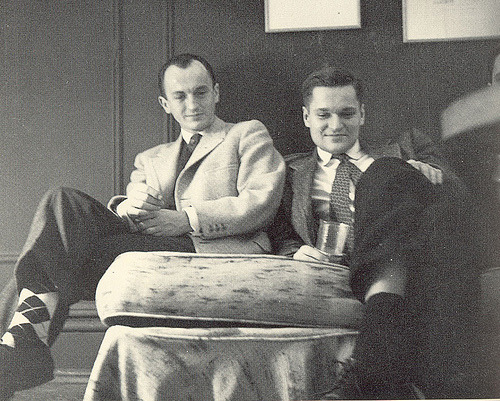
How to Continue
Oh there once was a woman
and she kept a shop
selling trinkets to tourists
not far from a dock
who came to see what life could be
far back on the island.
And it was always a party there
always different but very nice
New friends to give you advice
or fall in love with you which is nice
and each grew so perfectly from the other
it was a marvel of poetry
and irony
And in this unsafe quarter
much was scary and dirty
but no one seemed to mind
very much
the parties went on from house to house
There were friends and lovers galore
all around the store
There was moonshine in winter
and starshine in summer
and everybody was happy to have discovered
what they discovered
And then one day the ship sailed away
There were no more dreamers just sleepers
in heavy attitudes on the dock
moving as if they knew how
among the trinkets and the souvenirs
the random shops of modern furniture
and a gale came and said
it is time to take all of you away
from the tops of the trees to the little houses
on little paths so startled
And when it became time to go
they none of them would leave without the other
for they said we are all one here
and if one of us goes the other will not go
and the wind whispered it to the stars
the people all got up to go
and looked back on love
John Ashbery

 THE WORLD
THE WORLD  Thursday, December 27, 2012 at 10:02AM
Thursday, December 27, 2012 at 10:02AM 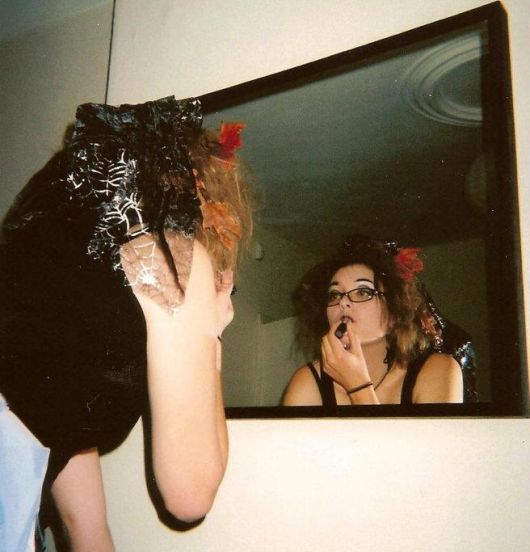
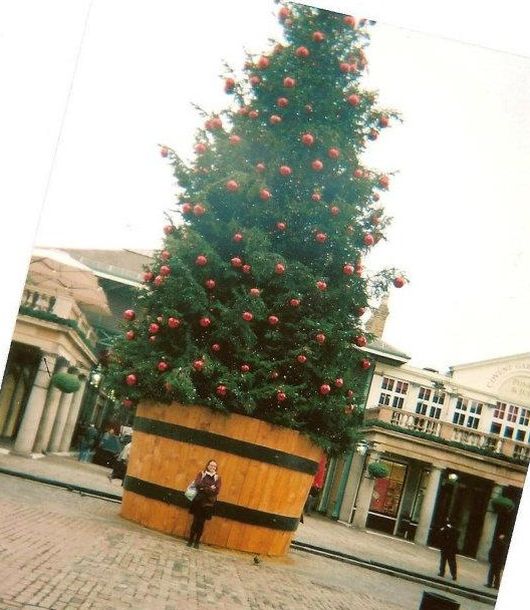
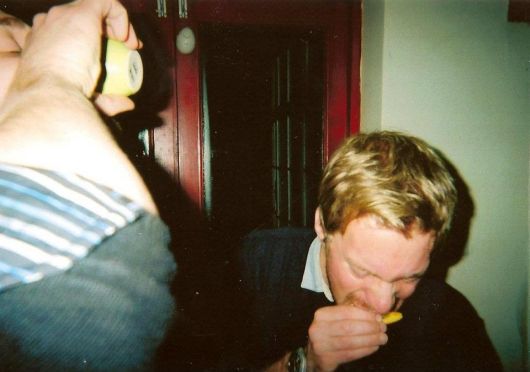
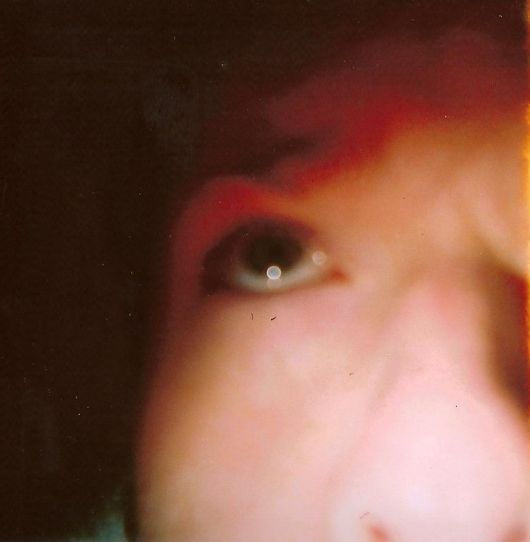

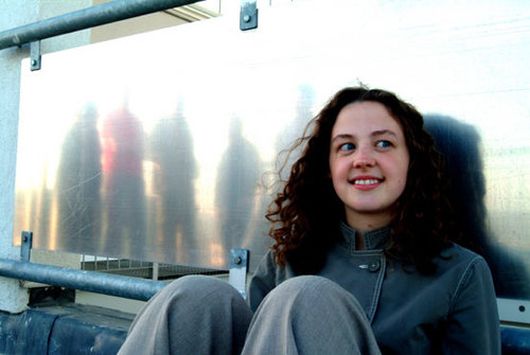
 frank o'hara,
frank o'hara,  grace hartigan,
grace hartigan,  rachel sykes
rachel sykes 






























